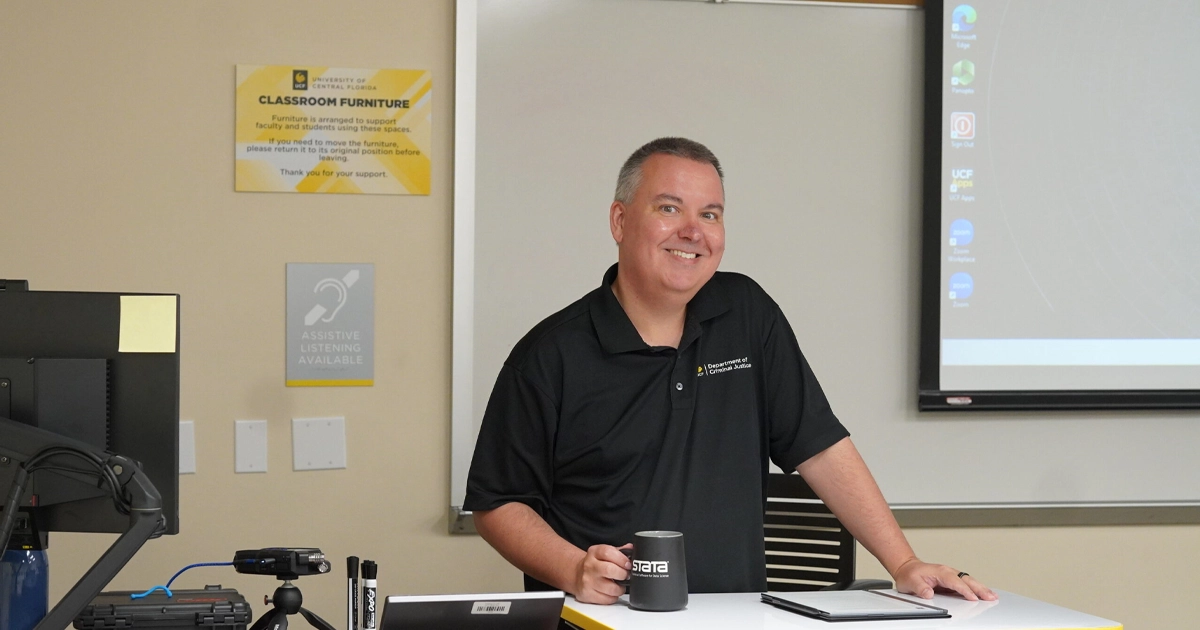Inspired by the challenges of using census data in social science research, Matt Nobles led an impactful workshop over the summer on U.S. census data processing.
BY EVAN CHIOVARI ’21

Matt Nobles guided participants through advanced techniques of census data processing in the ICPSR 2024 Summer Program.
Throughout the pandemic, people worked on all kinds of projects. Some tried gardening. Others learned how to bake bread. Matt Nobles created a process for customizing data from the U.S. census.
“During COVID, I investigated the American Community Survey — which represents the census — and tried to make it more accessible for research purposes,” says Nobles, a professor in the College of Community Innovation and Education’s Department of Criminal Justice. “After a few months, I found a way to process public releases from the census and develop a customizable data set. I thought this was something worth sharing.”
The project led to a sterling opportunity. Nobles was invited to lead a topical workshop for the Inter-university Consortium for Political and Social Research (ICPSR) 2024 Summer Program. The workshop spanned an intensive three days and focused on processing data from the American Community Survey.
ICPSR is an organization that archives American political and social science data. Its summer program has provided high-quality professional development to students and academics across the globe for over half a century. Many social scientists consider it to be the “gold standard” of methodological training because of high institutional standards and the advanced nature of subject matter.
Nobles says data from the census can be applied to several fields — including criminal justice, public health, mental health, sociology and economics — yet many social scientists find it challenging to use the census in their research projects. He cites this challenge as the motive for his workshop.
“My goal was to train people in data processing. They already know their science,” Nobles says. “I wanted to make sure that, no matter how little experience someone had with the data itself, everyone left knowing how to access the census and custom-craft a data set that would work for their projects.”
The workshop was comprised of 10 attendees who specialized in several fields and came from all over the country. Nobles spent nearly three months preparing for the workshop to condense several weeks of material into a few days’ worth of content.
“It’s the most preparation work I’ve done in many years of instruction,” Nobles says. “People from all different scholastic backgrounds can join the ICPSR Summer Program. Some of my participants studied public health and community outreach, while others had more specific hypotheses or research areas quite different from my own academic discipline. I learned as much from them as they learned from me.”
After providing background information about the census, Nobles demonstrated how to find various types of data within it using extensive software syntax. He then prompted participants to try it on their own.
“I wanted the workshop to feel like an informal discussion, especially since we had a tight schedule and the material is pretty dense,” Nobles says. “The participants had some great questions throughout, and that let us discuss their individual research projects and general areas of expertise.”
The feedback Nobles received was encouraging: Not only did his attendees take great interest in the training, but they said they wished the workshop had lasted longer. Toward the end of their time together, Nobles intrigued everyone by showing them how to make maps out of census data.
“Census maps make the data collection process feel tangible because they show how various attributes — characteristics such as population density and educational achievement — are spatially concentrated in a state,” Nobles says. “I thought the maps would be just an afterthought, but people wanted to spend more time with them.”
Going forward, Nobles has ideas for many other collaborative projects and research initiatives. He also hopes to lead more instruction on the census and data processing.
“To my knowledge, ICPSR had previously never offered a workshop that dealt with the census,” Nobles says. “I was honored to contribute to their instructional portfolio. As a professor, to be able to share advanced knowledge and equip other experts for success is really what it's all about.”